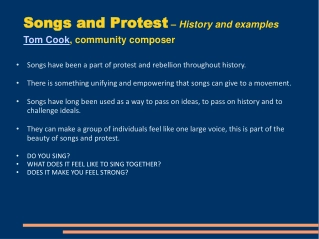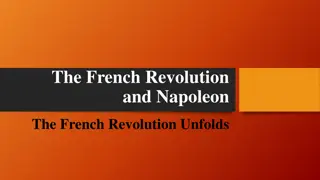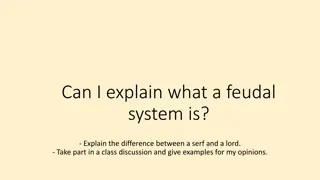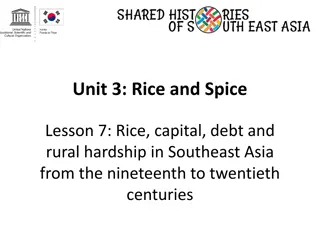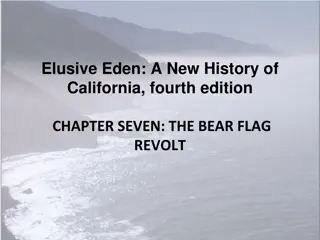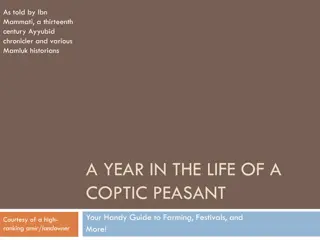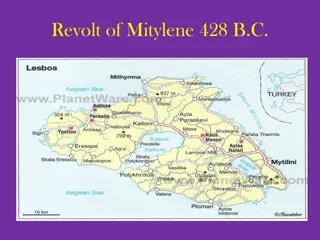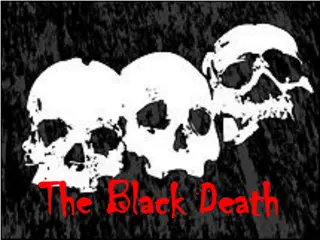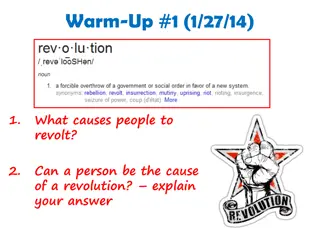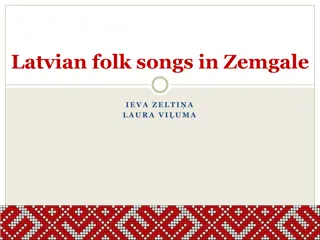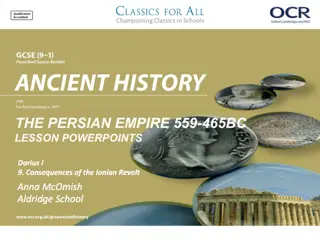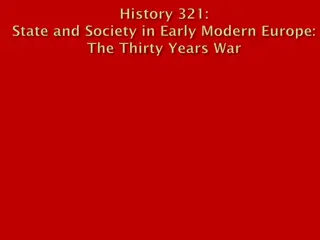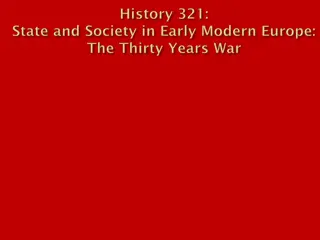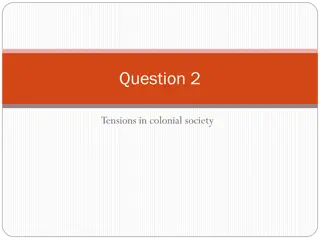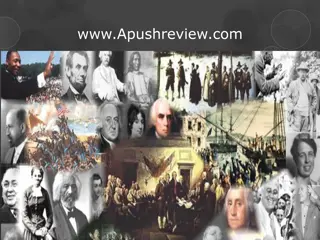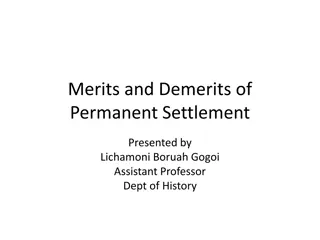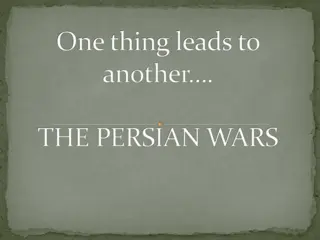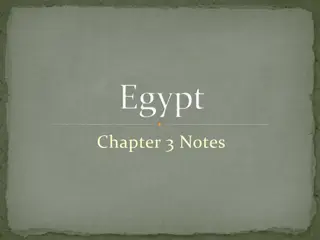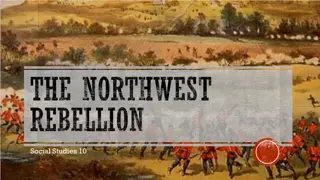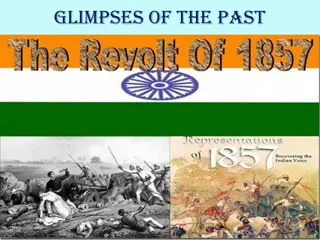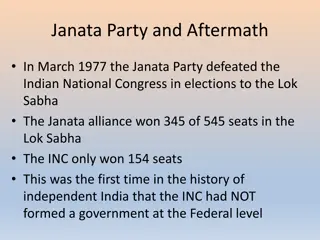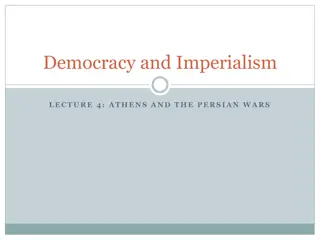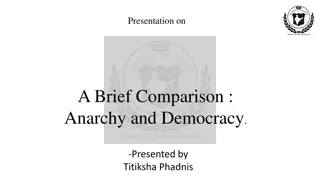French Revolution
Explore the transformative period of the French Revolution, starting with the Noble Revolt in 1787 and leading to the rise of a Radical Republic, the Terror of 1793-1794, and the eventual establishment of a Napoleonic Dictatorship. Learn about the key events, influential figures like Toussaint L'Ouv
4 views • 4 slides
Songs and Protest
Explore the deep-rooted connection between songs and protest throughout English history. From the traditional rebel song "The Cutty Wren" depicting the Peasants' Revolt in 1381 to the revolutionary actions of "The Diggers" in 1649, these songs have served as powerful tools for conveying dissent, cha
3 views • 12 slides
Unraveling the Entangled History of Ukraine and Her Neighbors
Explore the intricate history of Ukraine and its neighboring regions from the Middle Ages to the present day, focusing on nation-building phases, interactions with the peasantry, and cultural struggles under various empires. Witness key events like the liberation of peasants, language prohibitions,
0 views • 33 slides
Uncovering the Violent History of Capitalistic Enclosures
Explore the historical context of capitalist enclosures, their violent impacts on peasants, and the moral justifications used to conceal these atrocities. Delve into how economic narratives created moral bubbles to justify violent acts, as examined through the lens of Marx's analysis. Unveil the par
1 views • 11 slides
The American Revolution: Causes, Events, and Consequences
The American Revolution was sparked by British government control over the colonies and imposition of taxes without representation. Key events such as the Boston Massacre and Boston Tea Party further fueled the revolt. The war ended in victory for America and led to the birth of a new nation. Explor
2 views • 7 slides
The French Revolution and Napoleon: Unfolding of a Historic Era
The French Revolution, marked by political crises, revolts, and the rise of Napoleon, unfolded through phases of moderation, radicalism, and reaction. Peasants revolted against nobles, Paris became a revolutionary center, and the National Assembly acted to end aristocratic privileges. Explore the tu
2 views • 24 slides
Fall of Communism in Eastern Europe and the USSR: Renewal and End of the Cold War
The dissolution of the Soviet Union in December 1991 marked the end of an era, with the Revolution of 1989 seeing Soviet states revolt, culminating in the fall of the Berlin Wall symbolizing the collapse of Communism. Gorbachev's resignation on December 25th, 1991, swiftly followed by the dissolutio
0 views • 8 slides
Understanding the Feudal System: Lords, Serfs, and Hierarchy
The Feudal System was a social hierarchy where the king held control, and peasants did the work at the bottom. Lords owned the land while serfs worked on it. Explore the differences between a lord and a serf, how the system provided order and stability, and the new form introduced in England. Join a
1 views • 5 slides
Globalization and Economic Development in Southeast Asia's Rice Industry
Southeast Asia's rice industry played a crucial role in the region's globalization and economic development from the 19th to 20th centuries. Colonization, capitalism, and the rise of export industries led to significant changes in rural livelihoods, migration patterns, and trade relationships. Peasa
3 views • 17 slides
Historical Overview of 1st Maccabees: Key Events and Characters
The content provides a historical background on the book of 1st Maccabees, focusing on key dates such as the return from Babylonian captivity, construction of the Temple, and the reign of Alexander the Great. It introduces important figures like Mattathias and his sons, highlighting their role in re
2 views • 34 slides
The Bear Flag Revolt in California: A New Perspective
The fourth edition of "Elusive Eden: A New History of California" delves into Chapter Seven, exploring the Bear Flag Revolt of California in the early 1800s. It discusses the American interest in California, the concerns of Comandante General Jos Castro, and the interactions between Americans and Ca
3 views • 44 slides
Impact of the Normandy Invasion on Britain's Language and Society
Middle English became the language of Britain from 1066 to around 1500 after the Normandy Invasion led by William the Conqueror. This event introduced significant French influences to British language and culture. Additionally, the Canterbury Tales by Chaucer satirize members of different social cla
0 views • 16 slides
A Year in the Life of a Coptic Peasant: Farming, Festivals, and More!
Explore the agricultural calendar of a Coptic peasant through the eyes of thirteenth-century chroniclers as they navigate farming tasks, festive celebrations, and governmental dealings. From seed collection to tax submissions, experience the rituals, traditions, and challenges faced by peasants in a
0 views • 29 slides
The Impact of John Brown's Raid on Harper's Ferry
John Brown's raid on Harper's Ferry in 1859 was a pivotal event that escalated tensions between the North and South in the lead-up to the Civil War. Brown's failed attempt to arm enslaved individuals and spark a revolt had far-reaching consequences, leading to heightened sectional tensions and a gre
0 views • 7 slides
Impact of Shadow Boxing and Pad Work Training on Self-Confidence of Muay Thai Participants
Muay Thai participants at Revolt Gym engage in shadow boxing and pad work training to enhance their skills and build self-confidence. Self-confidence in sports is crucial for success, and these training methods play a significant role in developing mental and physical capacities. The study investiga
3 views • 8 slides
Revolt of Mitylene in 428 B.C.: Causes and Consequences
The revolt of Mitylene in 428 B.C. was driven by the Mytilenians' desire to break away from the Athenian Delian League and establish control over the entire island of Lesbos. Despite initial skirmishes and diplomatic efforts, the Mytilenians faced challenges as conflicting alliances and ambitions un
0 views • 41 slides
The Literary Journey of Susan Thomas: A Tribute to Her Remarkable Contributions
Susan Thomas, a renowned writer born in British India, has left a lasting impact with her over 100 novels and 20 collections of short stories primarily written in Bengali. Her works reflect on social issues, highlighting the lives of subaltern groups such as tribals, dalits, women, and peasants. Thr
0 views • 20 slides
The Devastating Impact of the Black Death in Europe: Origins, Spread, and Consequences
The Bubonic Plague, also known as the Black Death, ravaged Europe between 1347-1352, wiping out nearly 1/3 of the population. Originating from the Orient Rat Flea transported to Europe through trade routes, the disease caused severe symptoms such as enlarged lymph nodes, headaches, and skin discolor
0 views • 20 slides
Indigo: A Story of Gandhi's Struggle for Justice in Champaran
Louis Fischer narrates the inspiring tale of Mahatma Gandhi's fight against the unjust practices forced upon the poor peasants of Champaran. Through nonviolent civil disobedience, Gandhi successfully challenges the exploitative British landlords, leading to a significant victory for the oppressed fa
0 views • 9 slides
French Revolution Warm-Up Series
This series of warm-up activities explores various aspects of the French Revolution, such as causes of revolt, key events, changes during different phases, and the roles of significant figures like Napoleon. Students are prompted to analyze political cartoons, identify estate characteristics, sequen
0 views • 9 slides
Impact of Industrial Revolution on Andhra under British Rule
The Industrial Revolution in England had significant repercussions on Andhra under British rule, leading to a decline in local industries, exploitation of resources, and economic setbacks. Due to England's mercantilism, Andhra suffered the loss of self-sufficiency and prosperity, with industries bei
0 views • 12 slides
Latvian Folk Songs in Zemgale: A Glimpse into Rural Life
Latvian folk songs from the Zemgale region offer a window into the traditional life of farmers, focusing on seasonal rituals, work cycles, and celebrations. These songs not only reflect the agricultural practices and customs but also celebrate the connection between people and nature. The songs are
0 views • 9 slides
Unraveling the Consequences of the Ionian Revolt Through Historical Accounts
Delve into the aftermath of the Ionian Revolt and its impact on Persian-Greek relations. Explore the retaliation of Darius I, the reactions of various parties, and the geopolitical shifts that ensued. Analyze historical accounts to uncover the far-reaching consequences of this pivotal event.
0 views • 8 slides
Europe's Tragedy: Peace Negotiations and Historical Significance in the 17th Century
This content discusses the historical significance of events like the Truce of Ulm and Neapolitan Revolt in 1647, the major issues affecting the Empire during the Westphalian Congress in 1646-1648, peace negotiations involving Spain and the Dutch Republic, ongoing fighting during the Congress, and a
0 views • 5 slides
The Thirty Years War: Bohemian Revolt and European Conflict
The Thirty Years War began as a clash over political and religious issues with the Bohemian Revolt in 1618. Despite initial intentions for limited involvement, major powers were drawn into a prolonged conflict lasting three decades. The war involved various factions, including Protestant assemblies,
0 views • 20 slides
Comparative Analysis of Colonial Society Tensions
Explore the reflections of tensions in colonial society through the events of Bacon's Rebellion, Pueblo Revolt, Salem Witchcraft Trials, and Stono Rebellion. Each event, marked by unique conflicts and outcomes, illuminates the underlying societal struggles of the time, encompassing issues of power,
0 views • 13 slides
Colonial Era Rebellions and Conflicts in APUSH Review
Explore significant rebellions like Bacon's Rebellion, Pueblo Revolt, Stono Rebellion, and Leisler's Rebellion in the Colonial Era. Learn about their causes, impacts, and historical significance to better understand the conflicts that shaped early American history.
0 views • 10 slides
Analysis of Permanent Settlement in British India
The Permanent Settlement introduced by Lord Cornwallis in 1793 empowered zamindars to collect revenue, causing peasants to become tenants. While it provided security, it led to various issues such as high land revenue, conflicts, and hereditary landlords. The system failed to satisfy the British, za
0 views • 8 slides
The Persian Wars - One Thing Leads to Another
The Persian Wars were a series of conflicts triggered by events like the Ionian Revolt, leading to the Persian Empire seeking revenge on Athens. Starting with small fleets and culminating in the Battle of Marathon, the Greeks, though initially the underdogs, managed to repel the Persians. The Atheni
0 views • 15 slides
Causes of the French Revolution and Economic Factors Leading to Unrest
The French Revolution was fueled by a combination of political, social, and economic factors. Political causes included royal incompetence, denial of voice in government, and unpopular monarchs like King Louis XVI and Marie Antoinette. Social causes stemmed from the vast inequality among the three e
0 views • 14 slides
Exploring the Romantic Era: Poetry, History, and Major Poets
A detailed exploration of Romantic Poetry from 1798-1832, encompassing the defining characteristics, historical background, major poets including Wordsworth and Keats, and the influence of key events like the French Revolution. Romanticism is characterized by subjectivity, imagination, love for the
0 views • 4 slides
Understanding the Causes and Impact of the Russian Revolution
The Russian Revolution was fueled by a combination of factors, including weak leadership under Nicholas II, economic hardships, involvement in World War I, and the influence of figures like Rasputin. The Bolsheviks, led by Lenin and Trotsky, promised change and gained support from the peasants and w
0 views • 17 slides
Exploring Ancient Egypt: Chapter 3 - The Natural Environment, People, and Government
Valley of the Nile, agriculture, geographic isolation, the daily life of the majority peasants, the Pharaoh's divine rule, government under the Pharaoh, and the three kingdoms of Egypt are discussed in this chapter.
0 views • 12 slides
The Northwest Rebellion and Its Impact on Metis and Plains Peoples
The Northwest Rebellion in Canada during the late 19th century saw significant challenges faced by the Metis and Plains Peoples. The Metis struggled with broken promises of land, sparking anger and a call for ownership rights. In contrast, the Plains Peoples faced starvation as they became reliant o
0 views • 14 slides
Understanding Human Geography and Social Structures
Explore the distinctions between rural and urban living, social classes including Upper Class, Middle Class, Working Class, Peasants, and Lower Class. Learn about social mobility and how people in different classes lead their lives.
0 views • 19 slides
Life on a Medieval Manor: A Glimpse into Manor Living in Medieval Times
Discover the intriguing lifestyle on a medieval manor, where peasants to nobles played vital roles. From daily activities to the hierarchy within, explore the dynamics of living and working on a medieval estate.
0 views • 11 slides
Overview of the First War of Independence in India (1757-1857)
The content provides glimpses of India's past, focusing on the period from 1757 to 1857, leading up to the First War of Independence. It outlines the British East India Company's expansion, social issues in Indian society, British oppression, the role of key figures like Ram Mohan Roy, and the event
0 views • 16 slides
The Janata Party Era in Indian Politics: A Snapshot of Change and Challenges
The Janata Party's rise and fall in Indian politics from 1977 to 1980 marked a significant shift as it defeated the long-standing Indian National Congress. The alliance faced internal struggles, including leadership disputes and corruption charges that led to its downfall. Despite its short duration
0 views • 10 slides
The Impact of Athens and the Persian Wars on Democracy and Imperialism
The lecture delves into the historical events surrounding Athens and the Persian Wars, highlighting key milestones such as the expulsion of Hippias with Spartan help, Cleisthenes' reforms, and the rise of Archaic Greek imperialism in Athens and Sparta. Herodotus' perspective on the Persian Wars and
0 views • 21 slides
A Brief Comparison: Anarchy and Democracy in India
India's transition from anarchy under imperialist rule to democracy post-independence is explored through key legislative acts and reforms implemented over the years. The presentation examines the Regulating Act of 1773, Indian High Courts Act of 1861, and Government of India Acts of 1858, 1919, and
0 views • 15 slides

